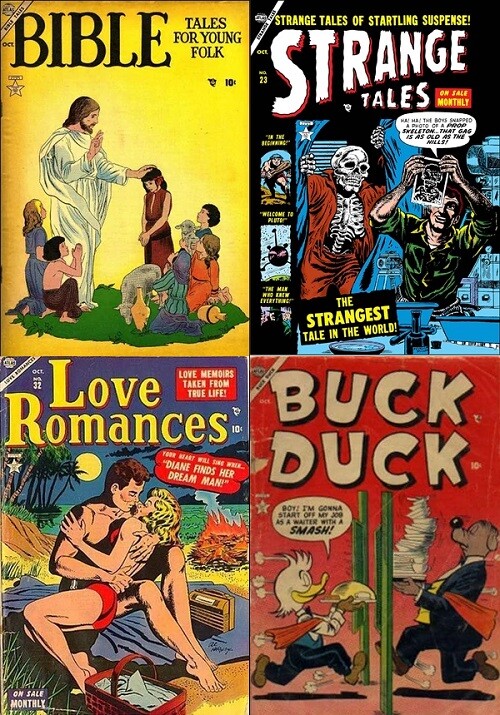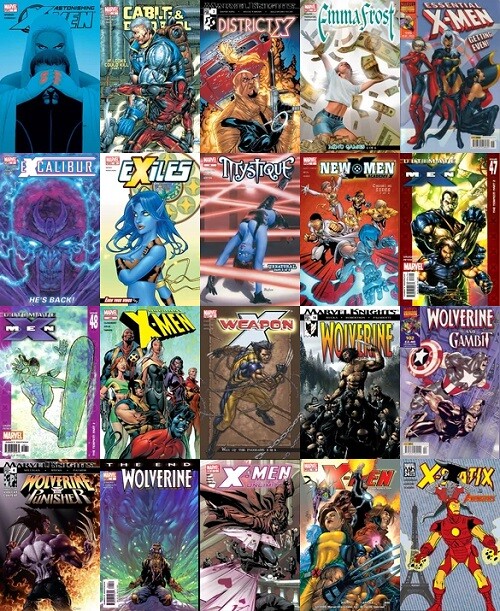Why Marvel Studios Is Branching Out Beyond Superheroes-- Sort Of

Over the past 30 years, Marvel's risen meteorically. The company's gone from pawning off its most lucrative superheroes to keep the lights on to hedging untold millions on D-list characters even the most obsessive fans barely remember. And now that Black Widow's finally hitting theaters, Cracked's looking at the past (and future) of the studio that revolutionized the modern superhero narrative. Check out part one here.
Whenever Marvel Studios announces a new thing, a part of the internet goes, "Oh, great, more superhero crap!" -- and we get it. These movies have been everywhere for well over a decade now. Children born after the first Iron Man film signaled the start of superhero media domination are now old enough to grow their own stupid Tony Stark facial hair. Out of the 25 top-grossing movies of the 2010s, eleven were superhero flicks, and we're not even counting the Fast and/or Furious franchise. It's like, how much money do you need, Disney?!
Don't Miss
But if you look at the movies coming up on Marvel's Phase Four, you might notice that ...
Phase Four Doesn't Feel Particularly Superhero-y
Let's start with Black Widow, which the trailers are selling as a Bond-esque spy caper -- we're surprised they didn't get Dua Lipa (or whoever the 2021 equivalent of Paul McCartney and Wings might be) to do the theme song. Other than the suits worn by David Harbour/Captain Beard and the bad guy who's cosplaying as every Avenger simultaneously, nothing really signals that this is a superhero movie.

Marvel Studios
Next up is Shang-Chi and the Legend of the Ten Rings, a martial arts fantasy film that's starting to look like a better Mortal Kombat movie than any actual Mortal Kombat movie. Which is crazy because that's DC's turf.

Marvel Studios
After that, we have Eternals, leaning heavily on that Game of Thrones But With Aliens vibe, from the casting to the guy composing the music to the golden font they used on the logo.

HBO

Marvel Studios
On the TV side, WandaVision turned out to be a really interesting meta-mix of genres (before reverting to the generic Marvel style at the end, but still), and The Falcon and the Winter Soldier is a buddy cop movie with super-cops. If you don't believe us, simply add Lethal Weapon saxophones to any given scene and watch as it comes together:
Meanwhile, Loki is about an ageless time- and space-traveler with a British accent who has fantastic powers, including the ability to switch genders. Yes, Marvel suckered us all into watching Doctor Who (with some Indiana Jones thrown in) and becoming even bigger nerds.

Marvel Studios
That's all we've seen from Phase Four so far, but in the coming years, we're getting another trippy wizard movie (Doctor Strange in the Multiverse of Madness), another funky '70s space opera (Guardians of the Galaxy Vol. 3), and, if the She-Hulk show is anything like her comics, a legal dramedy with a giant green Ally McBeal. And who knows, maybe Ant-Man and the Wasp: Quantumania will turn out to be a murder mystery set in a train, and Fantastic Four a Bollywood-style musical. Hell, we wouldn't be surprised if we end up with a Rawhide Kid series at this point (think Deadwood meets Queer Eye).
Now, we're not saying that Marvel Studios will suddenly start releasing Korean doramas and Czech documentaries. We're sure all of these movies and shows will still follow the tried and true "CGI action + witty banter + one (1) sad moment + big sky battle at the end" formula from other Marvel joint. Still, there's definitely been a push to mix that formula with more genres than before, and that's because ...
We're Going Into Marvel's Pastiche Period (As The Comics Did Before)
Remember back in 2013 when Disney announced that we were getting a new Star Wars film every year until the sun explodes, because how can there be too much Star Wars?! That changed after Solo: A Star Wars Story came out in 2018, and we found out that, oh yeah, that's how. Solo flopped, but what was even more alarming for Disney's execs was the fact that sales for Star Wars toys started going down too, and if kids aren't buying little plastic dog people, then what's the point of making movies? They dropped their "Star Wars up the wazoo" plans soon after that.
Given that Marvel belongs to the same omnipresent mega-corporation as Star Wars, it makes sense that the higher-ups would be prompted to find ways to prevent superhero fatigue, and going into other genres is a good way to do that -- especially since it has a historical precedent. When superheroes fell out of vogue at the end of World War II (after all, most were specifically created to punch Nazis), Marvel and DC's precursor companies saved themselves by publishing stuff like horror, war, crime, western, romance, and even religious comics. Here are four covers published by Marvel on the same month in 1953, along with precisely zero superhero comics:

Marvel Comics
As we've pointed out, Marvel Studios' current slate of movies looks a whole lot like Marvel Comics' lineup in the '70s -- Shang-Chi: Master of Kung Fu, The Eternals, She-Hulk, Moon Knight, and What If ...? all started then, as did Black Widow and Black Panther's first solo series. But maybe that's not a coincidence. After Marvel's massive success in the '60s, they started the next decade with another sales slump across their superhero series ... except for Incredible Hulk, because that was seen as more of a monster comic, and monsters were (no pun intended) all the rage.

Marvel Comics
And it wasn't just Marvel: DC's sales tanked even harder. Like some movie audiences today, comics readers back then were kinda fed up with superheroes. Marvel Comics managed to pull ahead by radically diversifying their output -- just like the studio is preemptively doing today, only they didn't wait for sales to fall this time. Also, there's no movie about Silver Surfer inexplicably fighting Dracula planned for Phase Four, unless we missed that particular announcement.
And there's another potential parallelism going on here ...
This Is All Great News For The X-Men (In The Long Run)
Something else 2020s Marvel Studios has in common with 1970s Marvel Comics: both are putting the X-Men on the bench. After Disney absorbed 20th Century Fox, all future X-Men projects were put "on hold" and eventually canceled. Well, all except the third Deadpool movie, but that one could easily ignore the X-Men altogether and end up being 90 minutes of Deadpool trolling Nick Fury (which would be great because he could finally finish saying "motherf ...").
The fact that Deadpool was allowed to live on suggests that Disney might have been more forgiving with the rest of the X-Men franchise if they were, you know, still making money. Both Dark Phoenix and New Mutants flopped pretty badly -- which is similar to the state of the X-Men comic in the early '70s when sales were so poor that Marvel stopped making new stories about ol' Chuck Xavier and the gang for five years. Of course, the X-Men had a huge comeback and eventually became so popular that they almost single-handedly kept Marvel afloat for a while. They are also likely the reason Marvel left the whole "diversity of genres" thing behind to focus on raking in those sweet mutant superhero bucks. Here are 25 covers published by Marvel in the same month in 2004, along with precisely zero Bible comics:

Marvel Comics
Perhaps more so than any other Marvel franchise, the X-Men can support multiple franchises of its own -- certainly, way more than, say, Iron Fist or Ant-Man (although a Luis spin-off starring Michael Pena would be pretty dope). And maybe that's why Marvel Studios is keeping them in their back pocket. The moment everyone starts getting fed up with the current crop of MCU heroes, they can spring the all-new, all-different X-Men on us and start milking them as Marvel Comics did in the '80.
In other words, yes, we expect the MCU to be at least 20% Wolverine series by 2040. You have our permission to leave a mean comment if it's anything less than that. That should give them at least another decade until they can bring back Robert Downey Jr. as a hologram and start everything all over again.
Follow Maxwell Yezpitelok's heroic effort to read and comment every '90s Superman comic at Superman86to99.tumblr.com.
Top Image: Marvel Comics
For more Cracked superhero deep dives, be sure to check out:
SUPERMAN WEEK:
4 Reasons Anyone Who Says 'Superman Is A Boring Superhero' Is Full Of It
4 Reasons O.G. Superman Is Even More Relevant Today
5 Superman Stories That Are Canon Kryptonite
4 Ways 'Death Of Superman' (Accidentally) Changed Pop Culture
4 Superman Movie Scenes That Were Dumb AF In Retrospect
JOKER WEEK:
The Early Obstacles On Joker's Path To Comic Icon
Why Do We Even Have Batman Movies Today? The Joker.
No One Was Ready For Mark Hamill's Joker ... Least Of All Mark Hamill
That Time DC Comics Turned The Joker Into David Bowie
A Dark Knight's Tale: How Heath Ledger Created A 21st Century Joker
The Weird Confusing Tale Of The Most 'Huh?' Movie Joker: Jared Leto
'Joker' Made A Billion Dollars, And That's Too Much Money To Ignore